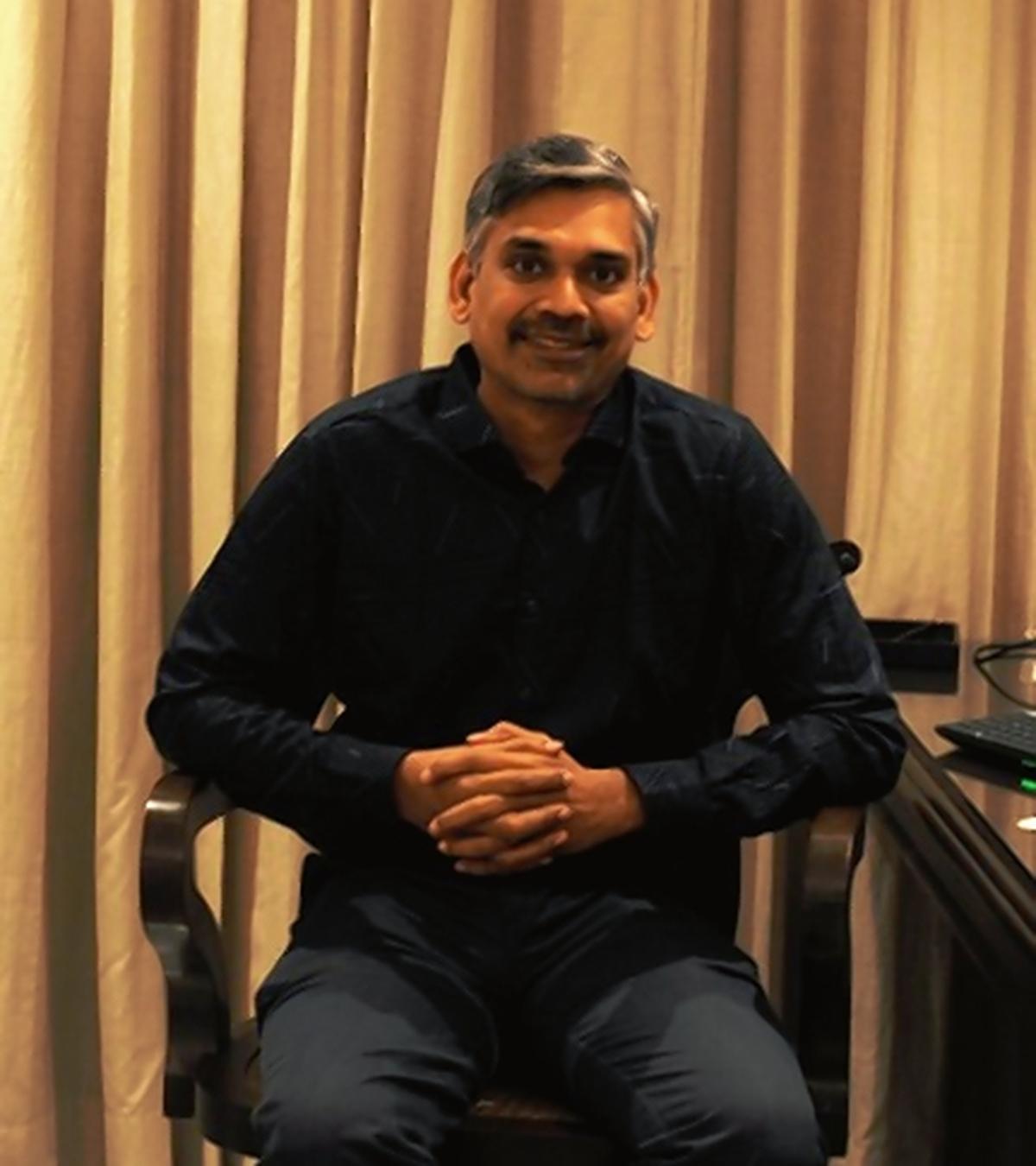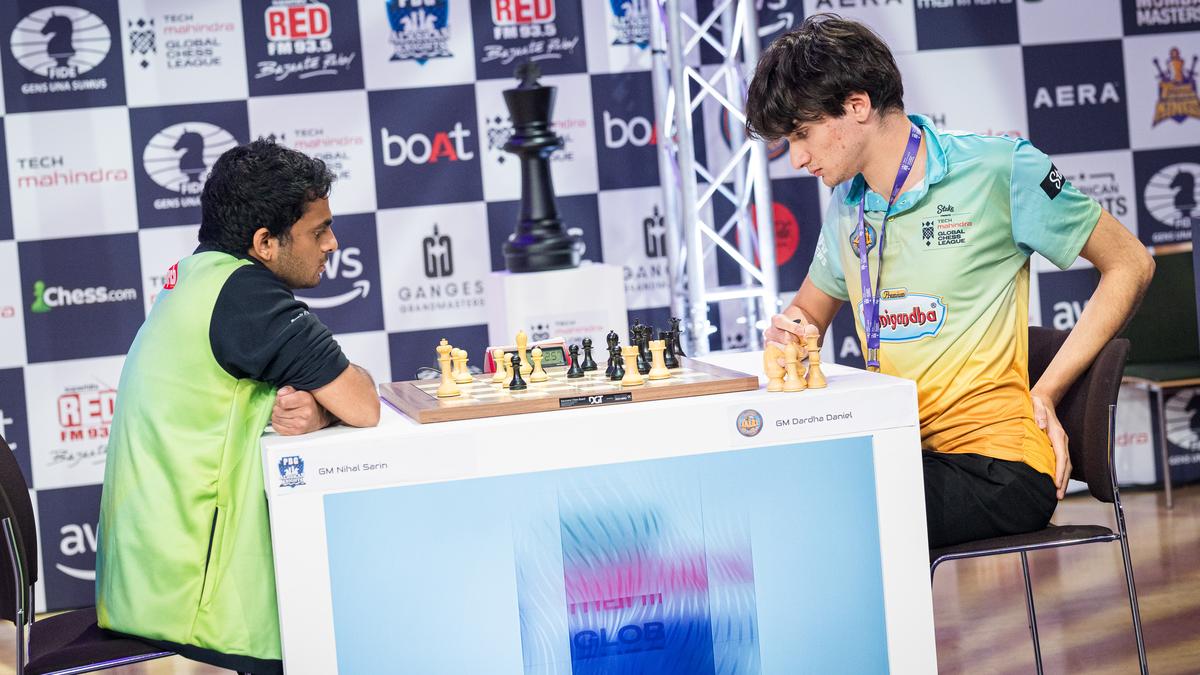Global Chess League 2024: Fresh debates on arbiters’ role take centrestage in Friends House
The Friends House in Central London has become the focal point for fresh debates surrounding the role and credibility of arbiters in chess, with the clash between India’s Nihal Sarin and Belgium’s Daniel Dardha being at the centre of it all.
The fifth round of the Global Chess League (GCL) on Sunday stirred controversy with Sarin claiming a draw after making a few illegal moves in the rush of a quick endgame and stopping his clock with only two seconds left.
In the Knights Variation of the Indian Game, SG Pipers’ Dardha found himself in a nearly lost position against Sarin of the PBG Alaskan Knights in a gruelling 99-move marathon. Despite being on the brink of defeat, Dardha clung on, leveraging his time advantage over Sarin. As the pressure scaled, an anxious Sarin stood up, blitzing his last few moves in a desperate attempt to deliver checkmate before being flagged (losing on time).
In the heat of the moment, both players hurried through their moves, often knocking pieces off the board in haste. With just two seconds remaining on the clock and no time increments allowed by the format, Sarin, whose chances had initially looked bleak, somehow salvaged a draw.
Sarin stopped his clock just in time, showing a remarkable display of composure to claim a draw. The arbiters intervened, assessing the situation, and after confirming with Dardha — who agreed with the claim — they ruled the game a draw.
A draw in the board after Nodirbek Abdusattorov and Tan Zhongyi, who both claimed wins with white against R. Praggnanandhaa and Hou Yifan respectively, nullified Magnus Carlsen’s win over Anish Giri with black pieces and his four-point contribution. This meant that the Alaskan Knights held on to their top spot on the points table, maintaining a three-point lead over the second-placed team, while Alpine Pipers slipped to third behind the Kings.
While Sarin’s actions were within the rules, his decision to claim a draw has sparked controversy, with five-time former world champion Carlsen leading the criticism.
Russian GM Ian Nepomniachtchi quickly weighed in, adding, “We all know that the vast majority of arbiters prefer to simply be present but never intervene. Traditions must not be broken!”
Sarin’s actions, though contentious, were in line with the FIDE guidelines for games without increments, particularly in quickplay finishes.
According to FIDE’s rulebook: “If Article III.4 does not apply and the player having the move has less than two minutes left on his/her clock, he/she may claim a draw before his/her flag falls. He/She shall summon the arbiter and may pause the chess clock. He/She may claim on the basis that his/her opponent cannot win by normal means, and/or that his/her opponent has been making no effort to win by normal means.”
Dronacharya Awardee and one of India’s top chess coaches, RB Ramesh, explained the rule surrounding draw claims. He stated, “The arbiters were not at fault here because the rules are clear: if a player has a winning position with less than two minutes on the clock, they can stop the clock, call the arbiter, and claim a draw due to the lack of time to make all the legal moves.”

One of India’s top chess coaches, R.B. Ramesh.
| Photo Credit:
Debasish Bhaduri/Kolkata
One of India’s top chess coaches, R.B. Ramesh.
| Photo Credit:
Debasish Bhaduri/Kolkata
“Whether the rule itself is right or wrong is a different debate. The arbiters cannot judge the validity of a rule; they can only enforce it as it stands. In Nihal’s case, he fulfilled both criteria—a winning position and less than two minutes on the clock—so the arbiter followed the rule and awarded him the draw. Personally, I think the real issue was that the players on the opposing team were unaware of this rule.”
Ramesh further explained that the arbiters had clearly communicated this rule during the captains’ meeting, and his team had conveyed it to their players. “The rule had also been posted in the respective teams’ WhatsApp groups, so it’s surprising that they missed this. But in this specific incident, I don’t think the arbiters were at fault.”
He acknowledged that conflicts between players and arbiters are not uncommon. “There are times when players aren’t happy with an arbiter’s decisions, or even their behavior. Sometimes, arbiters can come across as rude, but we can’t expect everyone to be perfect. Proper training is needed to ensure that arbiters respect the players and enforce the rules appropriately.”
In terms of illegal moves, Ramesh clarified the procedure. “The rules are straightforward: pieces must move according to the game’s laws, and any deviation is considered an illegal move. In tournaments with multiple boards, it’s impossible for arbiters to monitor each game constantly. If a player makes an illegal move, they must stop the clock and alert the arbiter, who will instruct the opponent to take back the move, issue a warning, and award the opponent two extra minutes of playtime for the first offense.”
Sarin, once lauded for his sportsmanship when he resigned after just three moves to World Champion Ding Liren — following the latter’s loss due to a poor internet connection during the Speed Chess Championship— now finds himself in a more precarious situation.
While Sarin’s claim was legitimate, the broader debate about arbiters’ roles in chess has intensified. US GM Fabiano Caruana, the current World No. 3, also shared his perspective on the matter in the C-Squared podcast, saying, “With all due respect, actually, not really with all due respect, chess arbiters are 95 per cent completely useless, and they have no idea what they’re doing. They don’t intervene whatsoever when illegal moves are being played.”
Caruana’s criticism aligns with the growing concerns over arbiters’ accountability and effectiveness, raising questions about whether their passive role is undermining the integrity of the sport.
There have also been several instances where players have expressed frustration and disregard for an arbiter’s intervention when they felt it was unwarranted.
One such case was the “shoegate” scandal during the 2024 Candidates Tournament, where Iranian-born French GM Alireza Firouzja voiced his complaints through social media. He revealed that arbiter Aris Marghetis asked him not to walk during his match against Nepomniachtchi, citing that his shoes were making too much noise. Firouzja claimed this intervention disrupted his focus, resulting in a draw. The situation escalated when Firouzja’s father became involved, deepening the sense of betrayal felt by the player.
A similar incident unfolded at the Tata Steel Tournament 2021 in Wijk aan Zee when the chief arbiter Pavel Votruba interrupted a game between Firouzja and GM Radoslaw Wojtaszek. They were asked to relocate their match to another board to make room for a playoff between Dutch GMs Anish Giri and Jorden van Foreest. The two-minute pause disrupted Firouzja’s focus, causing him to squander a winning position and settle for a draw. While the organisers issued a clarification and an apology, Firouzja’s camp felt the damage had already been done.
Another well-known incident took place at the World Blitz Championship during a match between Russian players Ian Nepomniachtchi and Daniil Dubov. The two players ended their game in a pre-arranged draw, engaging in an unusual “knight dance,” where only knight pieces were moved. The tournament’s chief arbiter, Ivan Syrovy, intervened suo moto and docked half a point from both players, claiming their actions brought the game into disrepute.
Much like tennis’ line calls, football’s tackle decisions, or the infamous umpire’s call in cricket, chess is not immune to the grey areas that come with discussions of bending the rules, sometimes changing them altogether.



